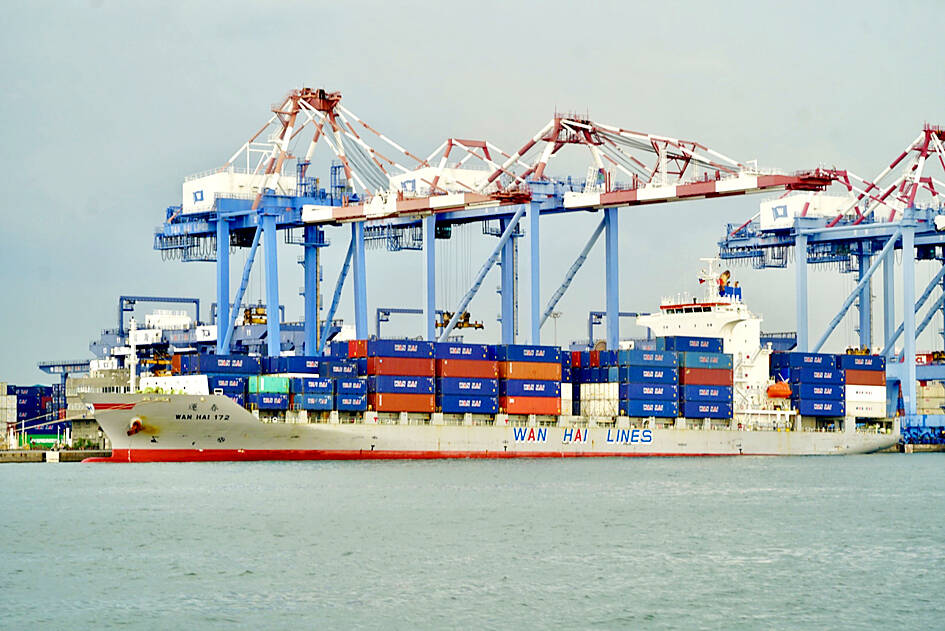Wan Hai Lines Ltd (萬海航運) plans to expand its capital expenditure for next year to NT$1.53 billion (US$49.2 million) from NT$1.3 billion this year, as it receives new vessels to boost its fleet, the shipping company told an online investors’ conference yesterday.
The spending for next year would surpass last year’s record NT$1.5 billion.
The shipping company plans to take delivery of 12 ships with a combined capacity of 52,430 twenty-foot equivalent units (TEUs) this year, 24 vessels with a combined capacity of 173,558 TEUs next year and 14 ships with a combined capacity of 103,040 TEUs in 2024, it said.

Photo: CNA
Overall, Wan Hai would receive 50 new vessels from this year to 2024, including 18 ships whose capacity exceeds 13,000 TEUs, which would be put on Asia-North America or Asia-South America routes, spokeswoman Laura Su (蘇麗梅) said.
Wan Hai’s business in the first half of the year was mainly focused on the intra-Asia market, which accounted for 59 percent of its freight volume, Su said, adding that the Americas accounted for 25 percent, up from 17 percent a year earlier.
Wan Hai’s revenue from North and South American operations made up 59 percent of its total revenue in the first half of the year, compared with 40 percent a year earlier, thanks to rising shipping rates for the American markets.
Shipping rates for the intra-Asia region dropped sequentially last quarter, which drove revenue contribution from this route down to 26 percent from 40 percent a year earlier.
Wan Hai president Tommy Hsieh (謝福隆) said he expects rates to recover next quarter,
“Since the third quarter is a slow season, a correction in shipping rates is normal, but next quarter would be a peak season,” he said.
Like Yang Ming Marine Transport Corp (陽明海運), Wan Hai’s clients have also asked to renegotiate freight rates and the company, in principle, would offer short-term discounts to address such requests to build up long-term partners, Hsieh said.

SEMICONDUCTORS: The firm has already completed one fab, which is to begin mass producing 2-nanomater chips next year, while two others are under construction Taiwan Semiconductor Manufacturing Co (TSMC, 台積電), the world’s largest contract chipmaker, plans to begin construction of its fourth and fifth wafer fabs in Kaohsiung next year, targeting the development of high-end processes. The two facilities — P4 and P5 — are part of TSMC’s production expansion program, which aims to build five fabs in Kaohsiung. TSMC facility division vice president Arthur Chuang (莊子壽) on Thursday said that the five facilities are expected to create 8,000 jobs. To respond to the fast-changing global semiconductor industry and escalating international competition, TSMC said it has to keep growing by expanding its production footprints. The P4 and P5

DOWNFALL: The Singapore-based oil magnate Lim Oon Kuin was accused of hiding US$800 million in losses and leaving 20 banks with substantial liabilities Former tycoon Lim Oon Kuin (林恩強) has been declared bankrupt in Singapore, following the collapse of his oil trading empire. The name of the founder of Hin Leong Trading Pte Ltd (興隆貿易) and his children Lim Huey Ching (林慧清) and Lim Chee Meng (林志朋) were listed as having been issued a bankruptcy order on Dec. 19, the government gazette showed. The younger Lims were directors at the company. Leow Quek Shiong and Seah Roh Lin of BDO Advisory Pte Ltd are the trustees, according to the gazette. At its peak, Hin Leong traded a range of oil products, made lubricants and operated loading

Citigroup Inc and Bank of America Corp said they are leaving a global climate-banking group, becoming the latest Wall Street lenders to exit the coalition in the past month. In a statement, Citigroup said while it remains committed to achieving net zero emissions, it is exiting the Net-Zero Banking Alliance (NZBA). Bank of America said separately on Tuesday that it is also leaving NZBA, adding that it would continue to work with clients on reducing greenhouse gas emissions. The banks’ departure from NZBA follows Goldman Sachs Group Inc and Wells Fargo & Co. The largest US financial institutions are under increasing pressure

TRENDS: The bitcoin rally sparked by US president-elect Donald Trump’s victory has slowed down, partly due to outflows from exchange-traded funds for the token Gold is heading for one of its biggest annual gains this century, with a 27 percent advance that has been fueled by US monetary easing, sustained geopolitical risks and a wave of purchases by central banks. While bullion has ticked lower since US president-elect Donald Trump’s sweeping victory in last month’s election, its gains this year still outstrip most other commodities. Base metals have had a mixed year, while iron ore has tumbled, and lithium’s woes have deepened. The varied performances highlight the absence of a single, over-riding driver that has steered the complex’s fortunes, while also putting the spotlight